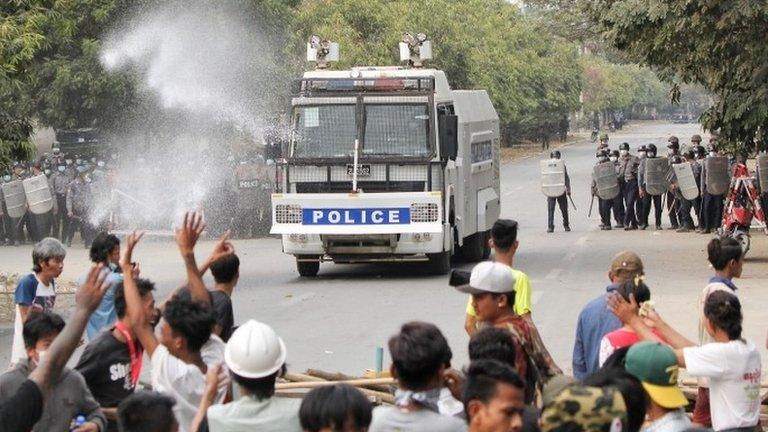Myanmar coup: Military leaders must release Aung San Suu Kyi - Raab
- Published
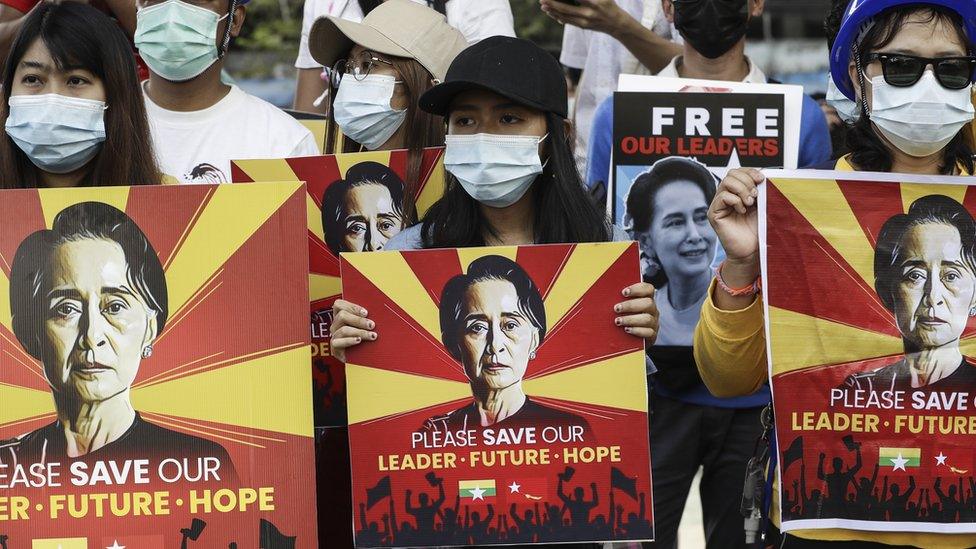
Aung San Suu Kyi and other civilian leaders are currently under house arrest
UK Foreign Secretary Dominic Raab has called on the leaders of Myanmar's military coup to release democratically elected leader Aung San Suu Kyi.
In a speech, Mr Raab called on the military to "step aside" and respect Myanmar's democratic process.
It comes after at least two people were killed in protests against the coup - the worst violence yet in more than two weeks of demonstrations.
However, tens of thousands have come out to protest on Monday.
The demonstrations - nicknamed the "22222 Revolution" - come despite a thinly-veiled threat by the military read out on a state-run broadcaster that protesters were heading down a path "where they will suffer loss of life".
Military leaders overthrew Ms Suu Kyi's elected government and have placed her under house arrest, charging her with possessing illegal walkie-talkies and violating the country's Natural Disaster Law.
Protesters are demanding an end to the military action and want her released along with senior members of her National League for Democracy (NLD) party.
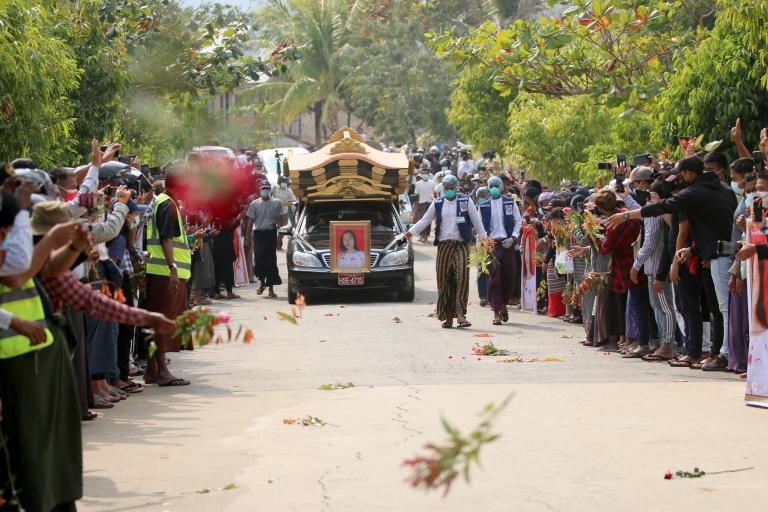
At the weekend hundreds of people attended the funeral of Mya Thwe Thwe Khaing, 20, the first protester to die since the protests began
Reacting to the two protesters' deaths on Twitter, Mr Raab said: "We will consider further action, with our international partners, against those crushing democracy and choking dissent."
He added that the shooting of peaceful protesters was "beyond the pale".
Speaking to the United Nations Human Rights Council later, Mr Raab said the situation in Myanmar, also known as Burma, is getting worse, with human rights violations and abuses "well-documented".
He said the crisis "presents an increased risk to the Rohingya and other ethnic minorities", and called for civilian leaders such as Ms Suu Kyi to be released.
From blindfolded protests to dressing like Aung San Suu Kyi, why creatives are concerning Myanmar's army
The foreign secretary also called for the UN to have "urgent and unfettered" access to investigate human rights abuses against people in camps in China.
And he criticised Russia for what he called the "disgraceful" jailing of the opposition leader, Alexei Navalny.
"His treatment and the violence inflicted on peaceful protesters can only further reinforce the world's concerns that Russia is failing to meet its international obligations," Mr Raab said.
China and Russia are both members of the UN Human Rights Council.
The council was set up in 2006 to replace the UN Commission on Human Rights, which faced widespread criticism for letting countries with poor human rights records become members.
The council meets three times a year, and reviews the human rights records of all UN members as well as setting up commissions of inquiry to report on human rights violations in countries including Myanmar, Syria, North Korea, Burundi and South Sudan.
What is happening in Myanmar?
Huge crowds have turned out in cities across Myanmar on Monday, as part of a general strike called against the military coup.
Thompson Chau, editor of local media outlet Frontier, told the BBC's World Service that today's protests "feel a lot bigger than before, with more roads blocked, highways blocked and shops closed everywhere we go".
"Today is more of a huge strike in a sense that everyone is not going to work. All the shops are closed."
Mr Chau adds that even those working for "official state companies, reporting and tax departments, government doctors, engineers", are all going on strike.
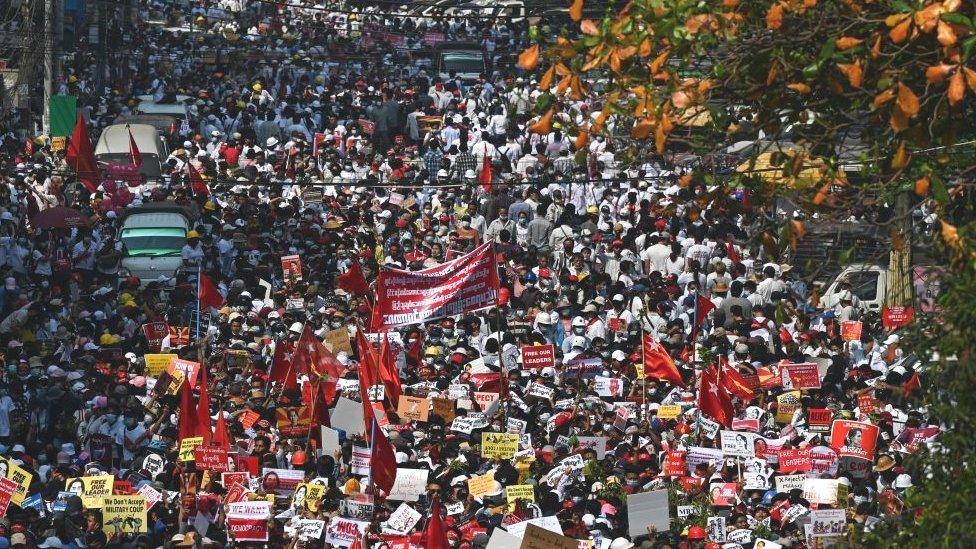
Protesters in Yangon...
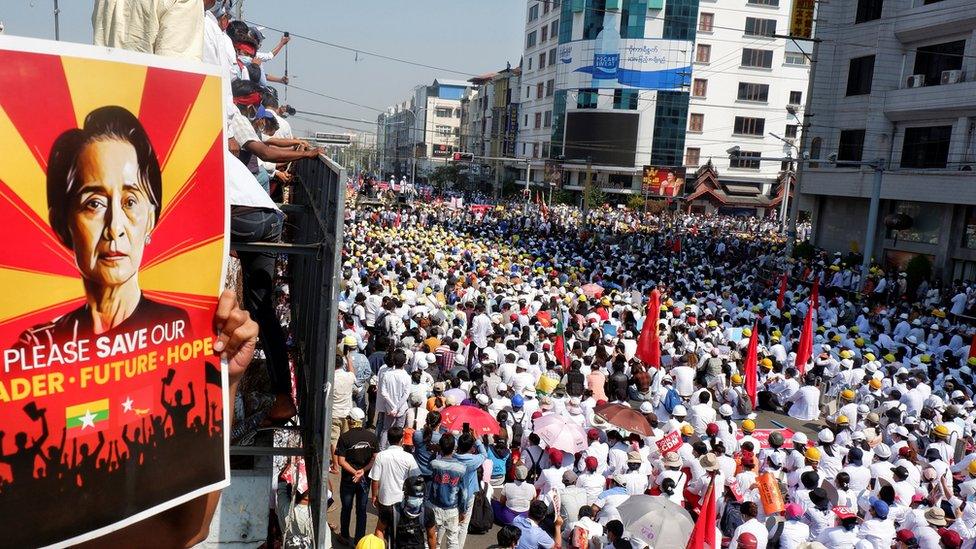
...and thousands of others in Mandalay
There have been no reports of violence today, despite the stern warnings delivered by the military.
Monday's protest, which has been nicknamed the "22222 Revolution", a reference to the digits in the date (22/02/2021), is being compared by protesters to demonstrations on 8 August 1988, known also as the 8888 uprising.
On that day, the Burmese military cracked down on anti-government demonstrations, killing hundreds of protesters. For many, the date is seen as a watershed moment in Myanmar.
- Published20 February 2021
